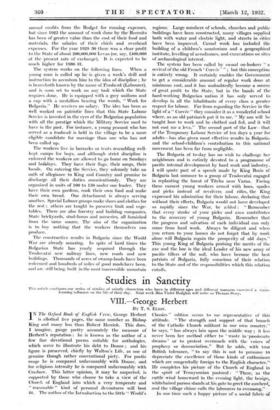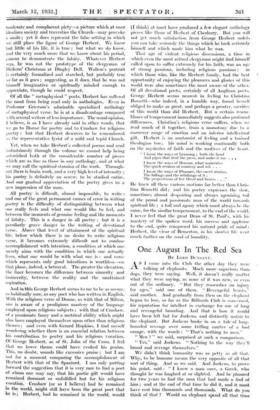Studies in Sanctity
This article continues our series of studies of saintly characters who have in different ages and different =timers exercised a trans- forming influence on the life of their day. Next week Miss Violet Hodgkin will write on Thomas Story.
VIII.—George Herbert
By T. S. Endo.
IN The atford Book of English Verse, George Herbert is allotted live pages, the same number as Bishop King and many less than Robert Herrick. This does, I imagine, gauge pretty accurately the measure of Herbert's reputation : he is known as the author of a few fine devotional poems suitable for anthologies, which serve to illustrate his debt to Donne ; and his figure is preserved, chiefly by Walton's Life, as one of genuine though rather conventional piety. For poetic range he is compared unfavourably with 'Donne, and for religious intensity he is compared unfavourably with Crashaw. This latter opinion, it may be suspected, is supported by those who choose to take a view of the Church of England into which a very temperate and
reasonable " kind of personal devoutness will best fit. The author of-the Introduction to the little "- World's
Classics " edition seems to me representative of this attitude. " The strength and support of that branch of the Catholic Church militant in our on-is country." he says, " has always lain upon the middle *ay ; it has never been her method either to ' waste in -passionate dreams' or to- protest overmuelr with the voices of prophecy or denunciation." But he adds, with true British tolerance, " to say this is not to presume to depreciate the excellence of those kinds of enthusiasm which arc congenitally foreign to the English character." He completes his picture of the Church of England in the spirit of Tennysonian pastoral : " There; as the cattle wind homeward in the evening light, the benign, whitehaired parson stands at his gate to greet the cowherd, -and the village"ehime calls the labourers to-'evensong."
In our- time such a -happy picture of social fabric of
moderate and . complacent piety7---a picture which at once idealizes. society. and travesties the Church—may provoke a smile ; yet it does represent the false .setting in which we still place the figure of George Herbert. We know but little of his life, it is true ; but what we do know, and the very much more that we know about his period, concur to demonstrate the falsity. Whatever Herbert was, he was not the prototype of the clergyman of Dickens' Christmas at Dingley Dell. Walton's portrait is certainly formalized and starched, but probably true so far as it goes ; suggesting, as it does, that he was not himself imaginative or spiritually minded enough to appreciate, though he could respect.
Of all the " metaphysical " poets, Herbert has suffered the most from being read only in anthologies. Even in Professor Grierson's admirable specialized anthology of metaphysical verse, he is at a disadvantage compared with several writers of less importance. The usual opinion, I believe, is as I have already said in other words, that we go to Donne for poetry and to Crashaw for religious poetry : but that Herbert deserves to be remembered as the representative lyrist of a mild and tepid Church: Yet, when we take Herbert's collected poems and read industriously through the volume we cannot help being astonished both at the considerable number of pieces which are as fine as those in any anthology, and at what we may call the spiritual stamina of the work. Through- out there is brain work, and a very high level of intensity ; his poetry is definitely an oeuvre, to be studied entire. And our gradual appreciation of the poetry gives us a new impression of the man.
All poetry is difficult, almost impossible, to write : and one of the great permanent causes of error in writing poetry is the difficulty of distinguishing between what one really feels and what one would like to feel, and between the moments of genuine feeling-and the moments of falsity. This is a danger in all poetry : but it is a peculiarly grave danger in the writing of devotional verse. Above that level of attainment of the spiritual life, below which there is no desire to write religious verse, it becomes extremely difficult not to confuse accomplishment with intention, a condition at which one merely aims with the condition in which one actually lives, *hat one would be with what one is : and verse which represents only good intentions is worthless—on that plane, indeed, a betrayal. - The greater the elevation, the finer becomes the difference between sincerity and insincerity, between the reality and the unattained aspiration.
And iu This George Herbert seems to me to be as secure, as habitually sure; as any poet who has written in English. With the religious verse of Donne, as with that of Milton, one is aware of a prodigious mastery of the language employed upon religious subjects ; with that of Crashaw, of a passionate fancy and a metrical ability which might also have employed themselves upon other than religious themes ; and even with Gerard Hopkins, I find myself wondering whether there is an essential relation between his contribution to poetry and his religious vocation. Of George Herbert, as of St. John .of the Cross, I feel that no lower theme could have evoked his genius. This, no doubt, sounds like excessive praise ; . but I am not for a moment comparing the accomplishment of Herbert with that of the Spaniard. - I am only putting forward the suggestion that it is very rare to find a poet of whom one .rnay say, that his poetic gift would have remained dormant or unfulfilled but for, his religious vocation. Crashaw (or so I believe) had he remained in the 'World, might still have been the great poet that be is r; Herbert, had he remained in the world, would
(I think) at most have produced a few elegant anthology pieces like those of Herbert of Cherbury. But you will not get much satisfaction from George Herbert micas you can take seriously the things which he took seriously himself and which made him what he was. • That age of violent religious dissensions, a time in which even the most retired clergyman might find himself called upon to suffer extremely for his faith, was an age
of strong passions, including religious passions ; in which those who, like the Herbert family, had the best opportunity of enjoying the pleasures and glories of this world were also sometimes the most aware of the other. Of all devotional poets, certainly of all Anglican poets, George Herbert seems nearest in feeling to Christina Rossetti—who indeed, in a humble way, found hermlt obliged to make as great, and perhaps a greater, saerilie, of this world than did Herbert. But a certain resell' blame of temperament immediately suggests also profinIn■I differences. Christina's religious verse suffers, when xr read much of it together, from a monotony due to a narrower range of emotion and an inferior intellectual gift. Herbert is an anatomist of feeling and a trained theologian too ; his mind is working continually both on the mysteries of faith and the motives of the heart.
"I know the ways of Learning ; both the head And pipes that feed the press, and make it run . ;
I know the ways of Honour, what maintains The quick returns of courtesy and wit . . .
I knot,: the ways of Pleasure, the sweet strains, The lullings and the relishings of it ; • The propositions of hot blood and brains . . ."
He knew all these various motions far better tluut Chris- tina Rossetti did; and his poetry expresses the slow, sometimes almost despairing and always agonizing toil of the proud and passionate man of the world towards spiritual life ; a toil and agony Which must always be the same, for the similar temperament, to the end of the world. I never feel that the great Dean of St. Paul's, with his mastery of 'the spoken word, his success and applause to the end, quite conquered his natural pride of mind Herbert, the vicar of Bemerton, in his shorter life went much farther on the road of humility.



















































 Previous page
Previous page